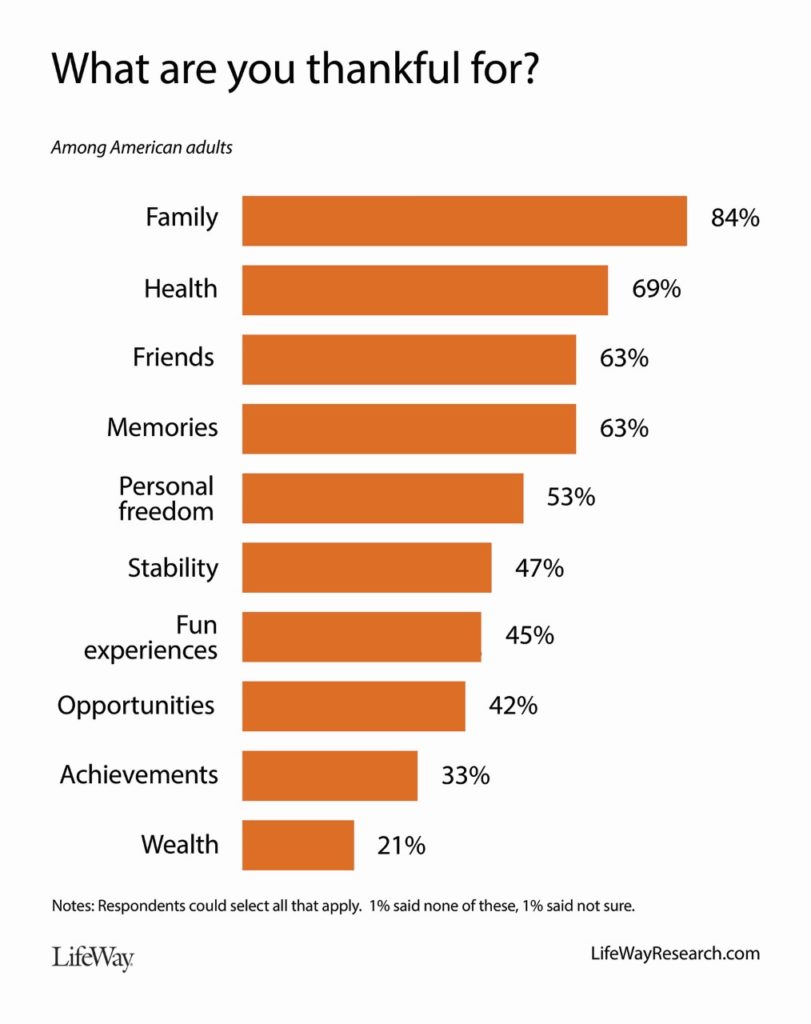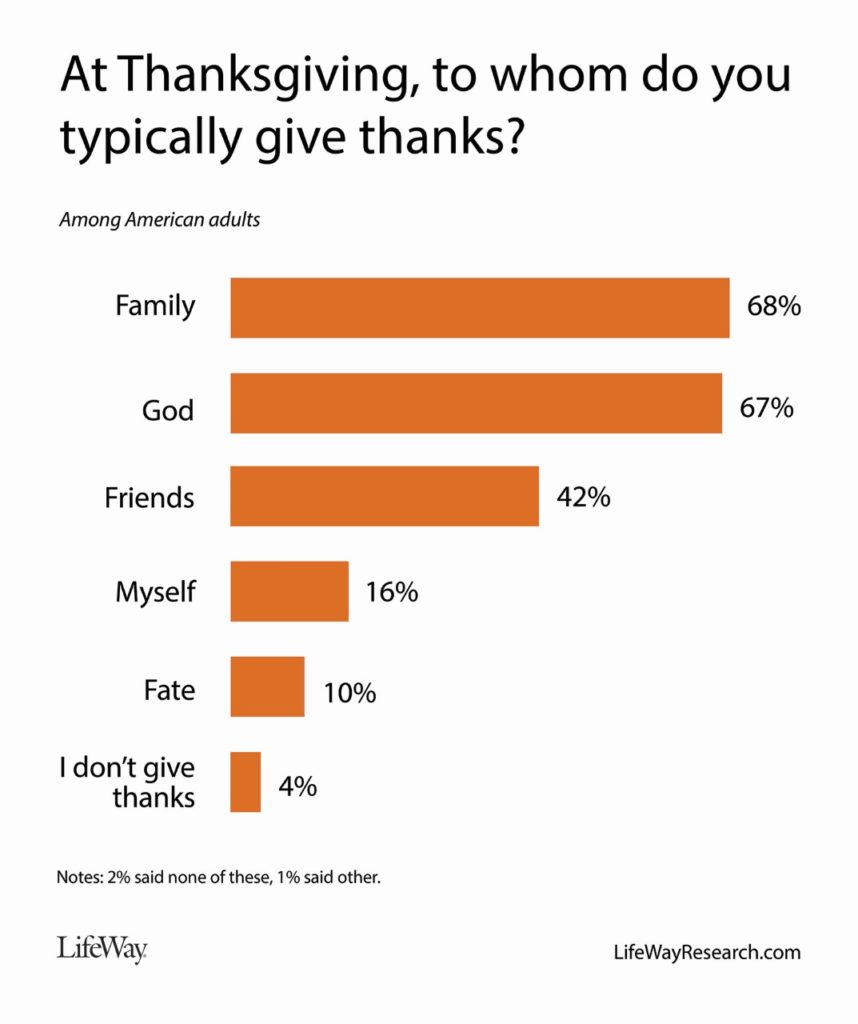
NASHVILLE (BP) – Even though the pandemic may change Thanksgiving celebrations this year, Americans still express thankfulness for their family and friends.
According to a survey from Nashville-based LifeWay Research, more than 4 in 5 Americans (84 percent) say they are thankful for their family.
Sizable majorities also note being thankful for health (69 percent), friends (63 percent) and memories (63 percent).
 Around half point to personal freedom (53 percent) and stability (47 percent). More than 2 in 5 are thankful for fun experiences (45 percent) and opportunities (42 percent).
Around half point to personal freedom (53 percent) and stability (47 percent). More than 2 in 5 are thankful for fun experiences (45 percent) and opportunities (42 percent).
A third of Americans will spend Thanksgiving being grateful for their achievements (33 percent), while 1 in 5 (21 percent) express thankfulness for their wealth.
The average person chose five things on the list for which they are thankful.
“In a year that has been difficult for most, Americans still express a lot of thanks,” said Scott McConnell, executive director of LifeWay Research. “This year of loss and division does not mean people have an absence of good things for which to be grateful.”
Compared to a 2016 LifeWay Research survey, fewer Americans expressed thankfulness for almost all of the options.
Four years ago, prior to the COVID-19 pandemic and the subsequent social distancing guidelines and regulations, more Americans said they were thankful for health (77 percent to 69 percent in 2020) and personal freedom (72 percent to 53 percent).
Other choices that also saw significant decreases from 2016 to 2020 include friends (71 percent to 63 percent), opportunities (59 percent to 42 percent), fun experiences (53 percent to 45 percent), achievements (51 percent to 33 percent) and wealth (32 percent to 21 percent).
Compared to other Americans, those with evangelical beliefs are more likely to say they are thankful for family (90 percent to 82 percent), health (80 percent to 66 percent), personal freedoms (69 percent to 50 percent), memories (68 percent to 61 percent), stability (56 percent to 45 percent), opportunities (56 percent to 38 percent) and achievements (38 percent to 31 percent).
Thankful to whom?
 When Americans give thanks on the last Thursday of November, most say they express their gratitude toward their family and God.
When Americans give thanks on the last Thursday of November, most say they express their gratitude toward their family and God.
Around 2 in 3 say they typically give thanks to family (68 percent) and God (67 percent), while 42 percent say they are grateful to their friends.
Fewer say they are thankful to themselves (16 percent) and fate (10 percent). Even fewer say they don’t give thanks (4 percent).
“Giving someone else thanks is not a given on Thanksgiving,” said McConnell. “But four times as many people give thanks to family or God than choose to thank themselves.”
This year, both family and friends saw 11-point jumps from 2016 when 57 percent were thankful to family and 31 percent to friends.
Thankfulness to myself (8 percent in 2016 to 16 percent) and fate (4 percent to 10 percent) also grew substantially in the past four years.
The percentage of those who say they are thankful to God in 2020 (67 percent) is similar to that of 2016 (63 percent).
Among self-identified Christians, those who attend worship services weekly are the most likely to express thanksgiving toward God this time of year (94 percent).
Those with evangelical beliefs are more likely than other Americans to say they are thankful to God (96 percent to 60 percent).
Protestants (83 percent) are more likely than Catholics (72 percent) and those belonging to other religions (62 percent). A third of religiously unaffiliated Americans (32 percent) are grateful to God on Thanksgiving.
Younger Americans are more likely to say they are thankful to themselves than older Americans.
A quarter of those aged 18 to 34 (24 percent) and 19 percent of 35- to 49-year-olds say they thank themselves on Thanksgiving, compared to 9 percent of those aged 50 to 64 and 6 percent of Americans 65 and older.
For more information, view the complete report or visit LifeWayResearch.com.
Methodology:
The online survey of 1,200 Americans was conducted Sept. 9-23, 2020 using a national pre-recruited panel. Quotas and slight weights were used to balance gender, age, region, ethnicity, education and religion to more accurately reflect the population. The sample includes an over-sample of Americans with evangelical beliefs providing additional reliability for breakouts of this group. Totals for all Americans reduce these responses to their correct proportion through weighting.
The completed sample is 1,200 surveys. The sample provides 95 percent confidence that the sampling error from the panel does not exceed plus or minus 3.2 percent. This margin of error accounts for the effect of weighting. Margins of error are higher in sub-groups. Comparisons are made to a probability-based survey of 1,000 Americans Sept. 28-Oct. 1, 2016.
Evangelical beliefs are defined using the National Association of Evangelicals and LifeWay Research evangelical beliefs research definition based on respondent beliefs. Respondents are asked their level of agreement with four separate statements using a four-point, forced choice scale (strongly agree, somewhat agree, somewhat disagree, strongly disagree). Those who strongly agree with all four statements are categorized as having evangelical beliefs:
- The Bible is the highest authority for what I believe.
- It is very important for me personally to encourage non-Christians to trust Jesus Christ as their Savior.
- Jesus Christ’s death on the cross is the only sacrifice that could remove the penalty of my sin.
- Only those who trust in Jesus Christ alone as their Savior receive God’s free gift of eternal salvation.
















